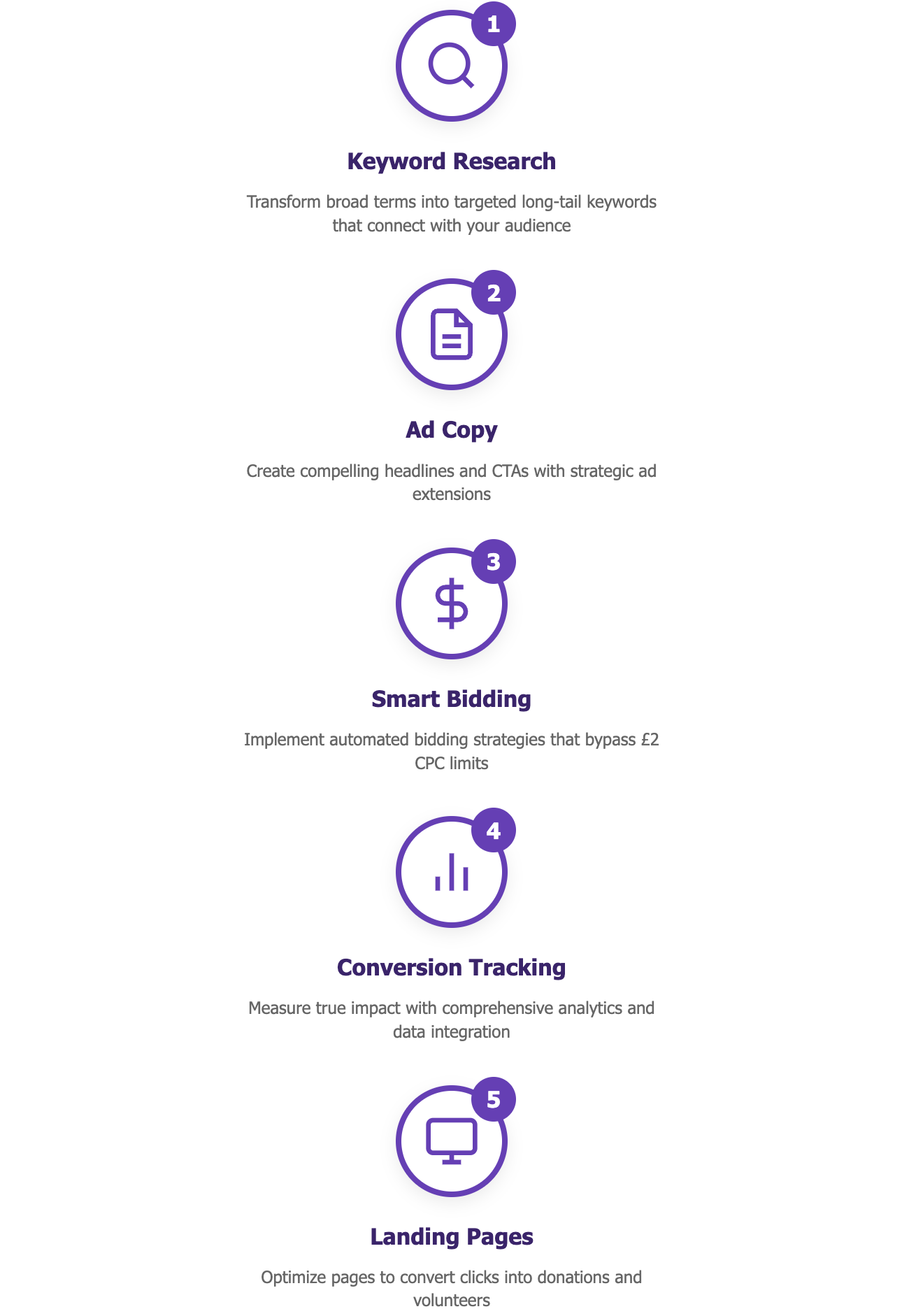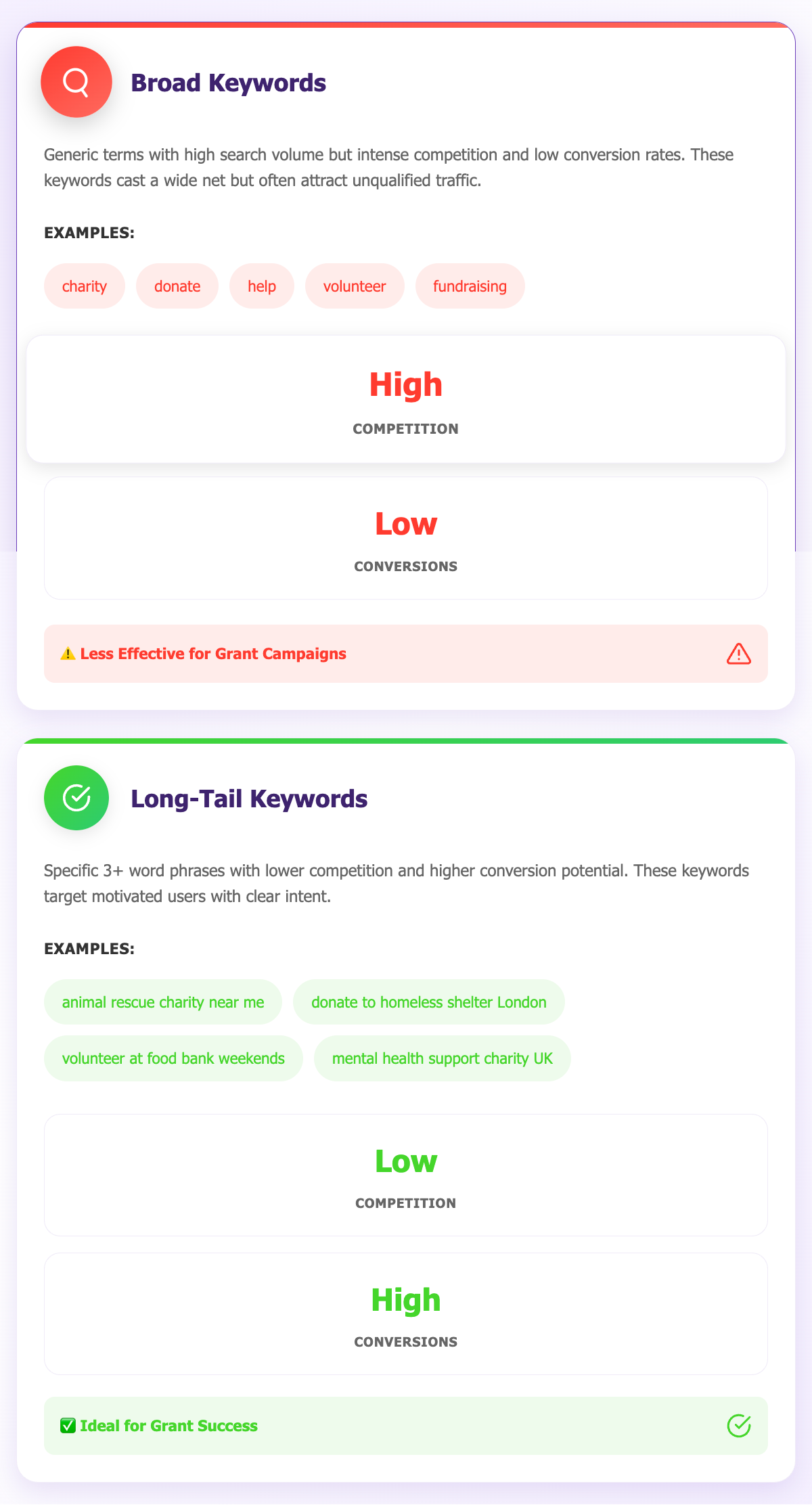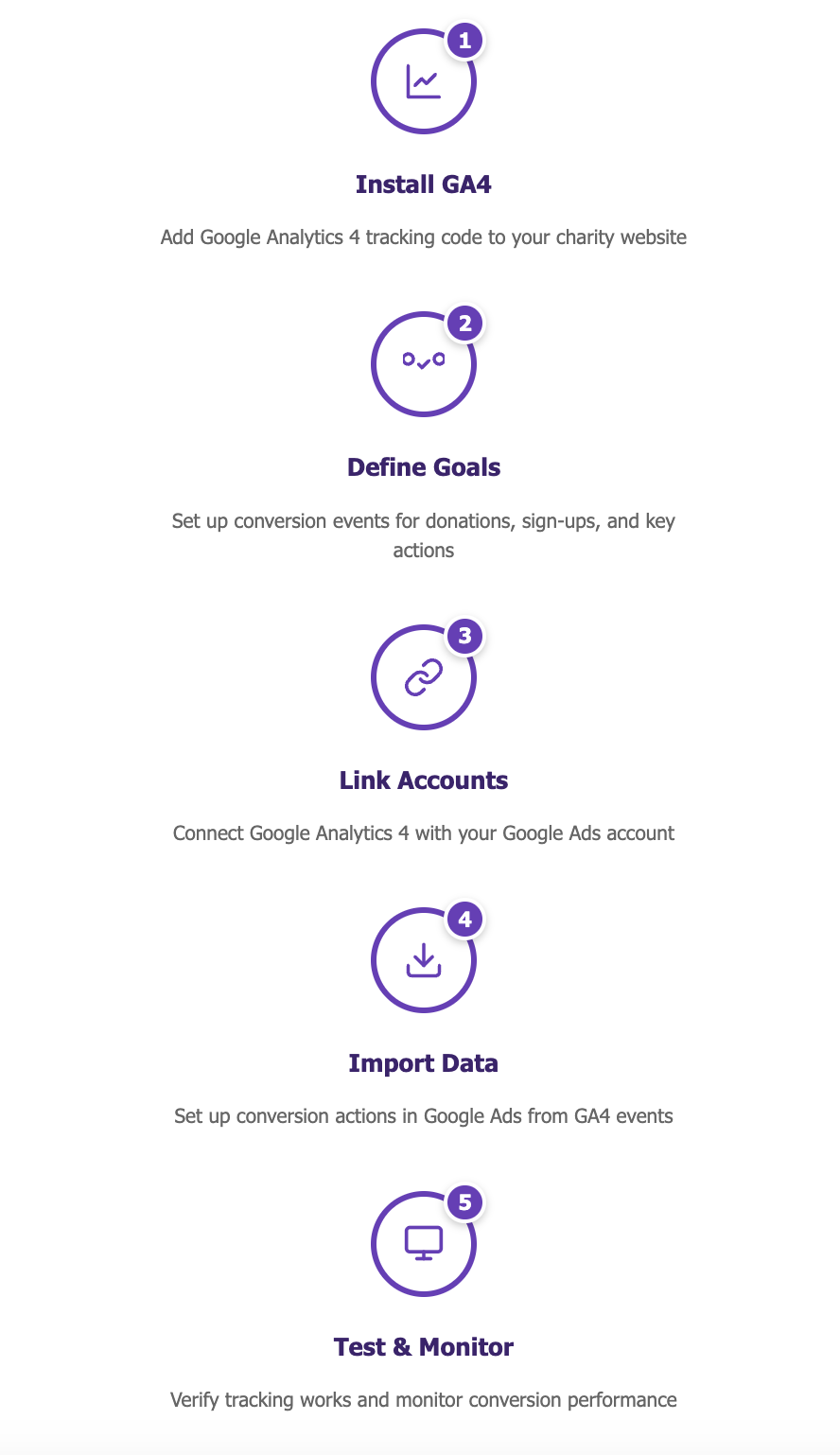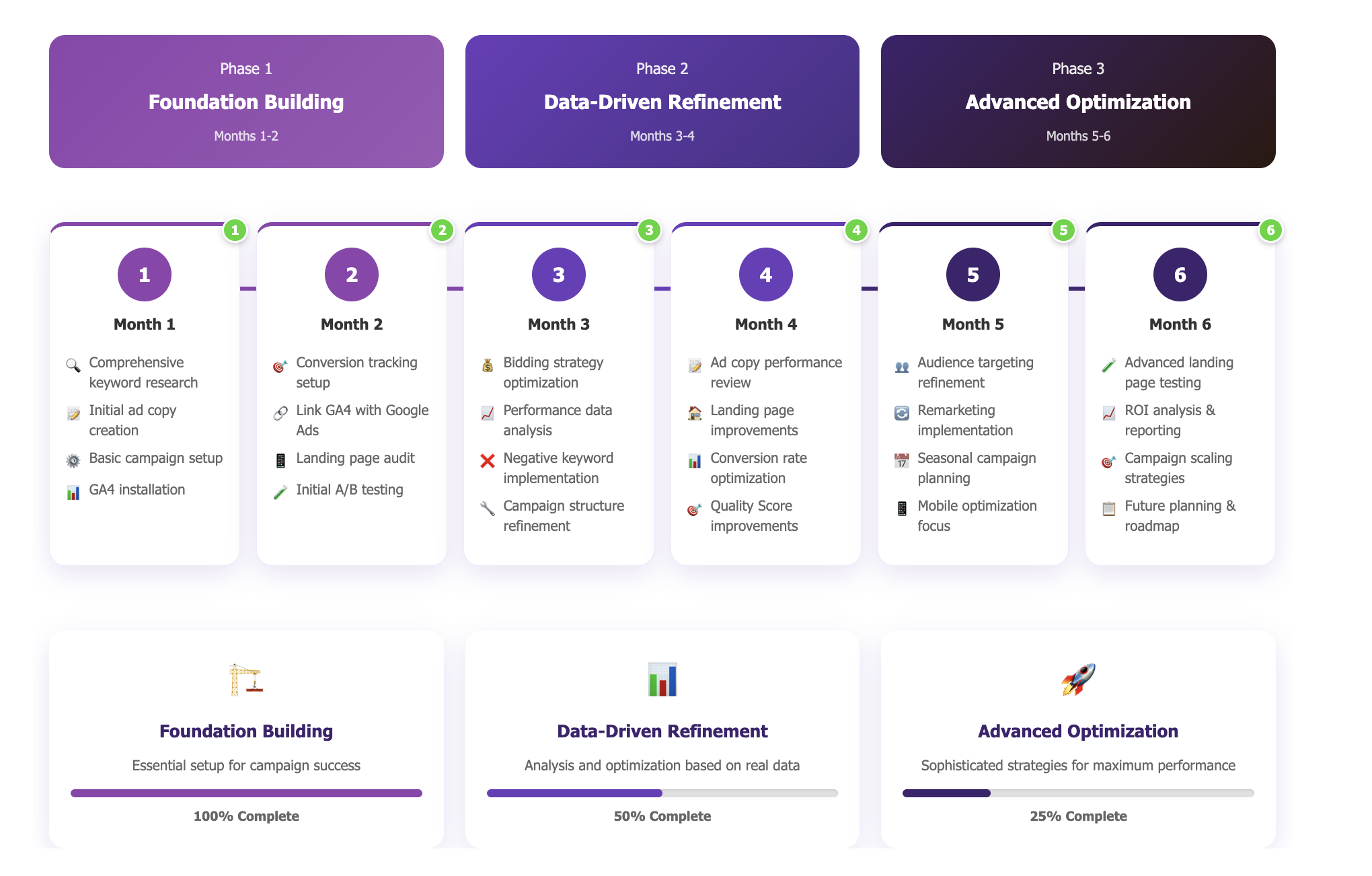Understanding Advanced Optimization for UK Charities
Your 5-Stage Google Ads Grant Journey
From initial setup to advanced optimization, here's the path to success.
Understanding Advanced Optimization for UK Charities

The Google Ads Grant provides UK nonprofits with up to £7,500 monthly in advertising credit, but simply having access to this funding isn’t enough. Strategic optimization is essential to transform this opportunity into measurable impact for your organization’s mission.
Advanced optimization involves systematic refinement of five critical areas: keyword research, ad copy development, bidding strategies, conversion tracking, and landing page enhancement. When implemented correctly, these strategies can dramatically improve your campaign performance and help you reach more supporters, volunteers, and beneficiaries.
In-Depth Keyword Research: Identifying High-Potential Terms
Effective keyword research forms the bedrock of a successful Google Ads Grant strategy. It ensures that a UK nonprofit’s advertisements are displayed to individuals who are genuinely interested in their mission and the services they provide.
Strategic Keyword Selection Process
To identify high-potential keywords, organizations should leverage tools such as Google’s Keyword Planner and other search engine optimization (SEO) resources. These tools provide valuable data on search volume, competition, and related keyword ideas.

A particularly effective strategy is to focus on long-tail keywords, which are specific phrases consisting of three or more words. These longer, more nuanced queries often target niche audiences and tend to have lower competition compared to broad, generic terms.

Competitor Analysis and Negative Keywords
To identify high-potential keywords, organizations should leverage tools such as Google’s Keyword Planner and other search engine optimization (SEO) resources. These tools provide valuable data on search volume, competition, and related keyword ideas.
A particularly effective strategy is to focus on long-tail keywords, which are specific phrases consisting of three or more words. These longer, more nuanced queries often target niche audiences and tend to have lower competition compared to broad, generic terms.
Crafting Compelling Ad Copy that Drives Engagement
Compelling ad copy is crucial for capturing the attention of potential supporters and driving engagement with a UK nonprofit’s Google Ads. Well-written advertisements can significantly improve the click-through rate (CTR) and ultimately lead to more relevant traffic to the organization’s website.
Essential Ad Copy Components
Strong Headlines and Descriptions Effective ad copy includes clear, concise, and compelling headlines and descriptions that immediately highlight the nonprofit’s unique value proposition and the impact of their work.
Powerful Calls to Action Incorporating strong calls to action (CTAs) is vital. These phrases explicitly tell users what the nonprofit wants them to do:
- “Donate Now”
- “Volunteer Today”
- “Learn More”
Maximizing Ad Extensions
To further enhance ad visibility and provide additional information, nonprofits should utilize ad extensions:
🎯 Live Ad Extensions Demo
Toggle Ad Extensions
Advanced Ad Optimization Techniques
A/B Testing Approach Experimenting with different variations of ad copy is a valuable optimization technique. By testing different headlines, descriptions, and CTAs, nonprofits can identify which messaging resonates most effectively with their target audience.
Responsive Search Ads (RSAs) RSAs allow nonprofits to input multiple headlines and descriptions, and Google’s algorithm automatically tests different combinations to determine which ones yield the best performance.
Key Insight: Ad extensions serve as a valuable tool for nonprofits to enrich their ads, provide more pertinent details, and increase their overall presence on the search results page.
Strategic Bidding Approaches for Google Ad Grants
While the Google Ad Grants program offers manual bidding with a maximum cost-per-click (CPC) limit of £2, Google strongly recommends that nonprofits utilize automated bidding strategies for their accounts.
Recommended Bidding Strategies
Maximize Conversions This strategy aims to achieve the highest possible number of conversions (e.g., donations, sign-ups) within the nonprofit’s daily budget.
Maximize Conversion Value If the nonprofit is tracking different conversion values (varying donation amounts), this strategy might be more appropriate.
Target CPA (Cost Per Acquisition) Allows the nonprofit to set a desired cost for each conversion achieved.
🎯 Find Your Bidding Strategy
📊 Bidding Strategy Dashboard
- Full control over individual keyword bids
- Maximum £2 per click restriction
- Requires constant monitoring
- Limited by manual optimization
- Machine learning optimization
- Real-time bid adjustments
- Better performance over time
- Goal-based optimization

Interactive demo not avaliable on mobile. Sorry!
Strategic Progression for New Campaigns
For newly created campaigns without sufficient conversion data:
- Start with Maximize Clicks – Focus on driving traffic to build data
- Transition to Maximize Conversions – Once sufficient conversion data is available
- Refine with Target CPA – For established campaigns with clear cost targets
Key Insight: Automated bidding strategies help UK nonprofits effectively bypass the limitations of the manual £2 CPC bid limit and achieve improved campaign performance.
Key Insight: Beginning with “Maximize Clicks” for new campaigns and shifting to conversion-based strategies provides a logical progression for building effective optimization foundations.
Implementing and Leveraging Conversion Tracking
Implementing robust conversion tracking is absolutely essential for UK nonprofits utilizing the Google Ads Grant. Conversion tracking allows organizations to accurately measure the tangible impact of their advertising campaigns.
The 5 Steps to Effective Conversion Tracking
Unlock data-driven insights by properly tracking what matters most.

Google Analytics 4 Integration
To gain comprehensive understanding of user behavior and campaign performance, connect the Google Ads account with Google Analytics 4. This integration provides valuable data and insights into how users interact with the website after clicking on an ad.
Strategic Goal Definition
Nonprofits should carefully define meaningful conversion goals that directly align with their overarching organizational objectives. For example, if the primary goal is to increase online donations, then the completion of a donation form should be set up as a key conversion to track.
Key Insight: Conversion tracking is fundamental for understanding the true value and return on investment of the Google Ads Grant and for optimizing campaigns to achieve specific nonprofit goals.
Key Insight: The integration of Google Ads with Google Analytics offers a more holistic view of the user journey, enabling more informed and strategic optimization decisions.
Landing Page Optimization: Enhancing User Experience and Achieving Goals
Optimizing landing pages is a critical step in maximizing the effectiveness of a UK nonprofit’s Google Ads Grant campaigns. The landing page design and content play significant roles in whether clicks ultimately lead to desired conversions.
🎯 Optimization Checklist
📱 Landing Page Preview
Help Animals in Need
Your donation makes a difference
Manchester Animal Rescue has been saving abandoned and injured animals for over 30 years. Every donation helps provide medical care, shelter, and love to animals who need it most.
With your support, we've rescued over 5,000 animals and found them loving homes. Join our mission to give every animal a second chance at happiness.
Make a Donation

Interactive demo not avaliable on mobile. Sorry!
Essential Landing Page Elements
Relevance Alignment Ensure landing pages are highly relevant to the specific ads and keywords that triggered the click. The headline and content should directly align with the ad message.
Clear Visual Hierarchy
- Compelling title with nonprofit’s logo for brand recognition
- Strong and easily visible call to action (CTA)
- Language that speaks directly to the audience who clicked the ad
Conversion-Focused Design Principles
Minimize Distractions Limit the number of links and buttons leading to other pages to keep visitors focused on the intended action.
Build Trust Include testimonials or other forms of social proof to help build trust and encourage conversions.
Mobile Optimization Ensure pages load quickly and are fully mobile-friendly for positive user experience and preventing drop-offs.
Key Insight: Optimizing landing pages is crucial for converting ad clicks into meaningful actions such as donations or sign-ups.
Key Insight: Essential landing page elements contribute to positive user experience and significantly increase the likelihood of achieving campaign objectives.
Measuring Success: Key Performance Indicators
These key performance indicators help measure the effectiveness of your Google Ads campaigns. A strong click-through rate shows that your ads are engaging the right audience. Conversion rate and cost per conversion track how efficiently your ads drive meaningful actions, while quality score reflects the overall relevance and user experience — all critical to making the most of your Google Ads Grant.
6-Month Google Ads Grant Optimization Timeline
Systematic approach to maximizing your charity's advertising impact
- Comprehensive keyword research
- Initial ad copy creation
- Basic campaign setup
- GA4 installation
- Conversion tracking setup
- Link GA4 with Google Ads
- Landing page audit
- Initial A/B testing
- Bidding strategy optimization
- Performance data analysis
- Negative keyword implementation
- Campaign structure refinement
- Ad copy performance review
- Landing page improvements
- Conversion rate optimization
- Quality Score improvements
- Audience targeting refinement
- Remarketing implementation
- Seasonal campaign planning
- Mobile optimization focus
- Advanced landing page testing
- ROI analysis & reporting
- Campaign scaling strategies
- Future planning & roadmap

About Advanced Optimization Services
Non profit pulse teams help UK nonprofits and charities transform their Google Ads Grant allocation into powerful engines for growth, combining technical expertise with deep understanding of nonprofit objectives to deliver measurable increases in donations, volunteer recruitment, and mission advancement.
FAQs
While advanced tools can help, a well-structured Google Ads account and consistent management are often sufficient to achieve strong results within the grant framework.
Ideally, campaigns should be reviewed at least once per week, with more in-depth optimisations monthly to ensure continued performance and alignment with your organisation’s goals.
Yes — while there are spending limits, advanced techniques like audience targeting, refined keyword strategies, and conversion optimisation can significantly improve the value of your ad spend.
Without regular optimisation, your account could fall below Google’s performance thresholds (such as CTR), leading to reduced visibility or even suspension of the grant.
Google requires ongoing optimisation to keep your account active and performing well. Regular improvements help maintain eligibility and ensure your ads reach the right audience effectively.
Yes, Google provides this advertising credit at no cost to eligible organisations as part of their social impact initiatives.
The application process typically takes 2-4 weeks, depending on verification requirements and the completeness of your submission.
While basic digital marketing knowledge is helpful, Non-Profit Pulse specialises in helping UK charities navigate the Google Ads Grant process, from application through to optimisation.
Strategic campaign management is essential. Our team can help you develop and implement a plan that maximises your monthly advertising credit.
Yes. Accounts must remain active and meet performance and compliance requirements. Inactivity or policy violations may result in suspension or removal.
The grant is limited to text-only ads that appear on Google Search (not Display, YouTube, or Shopping). Ads must be mission-focused and relevant to your cause.
Yes. Many nonprofits run a paid Google Ads account in parallel to access full features like image ads, bidding flexibility, and broader targeting.
No, but ongoing eligibility reviews apply. You must log in regularly, maintain website and policy compliance, and show active campaign management.
